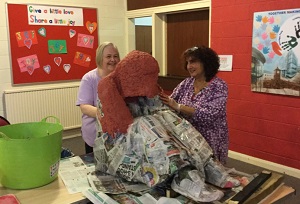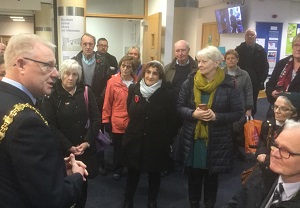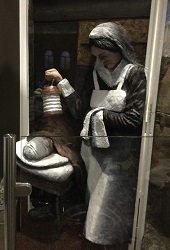 Church Related Community Worker Mal Breeze reflects on the significance of remembrance and what it means to him, to members of his Blackburn community, his faith and to everyone who has been touched by loss. Mal also reflects on how the face of the memorial day has changed in Britain and around the world, especially during the pandemic.
Church Related Community Worker Mal Breeze reflects on the significance of remembrance and what it means to him, to members of his Blackburn community, his faith and to everyone who has been touched by loss. Mal also reflects on how the face of the memorial day has changed in Britain and around the world, especially during the pandemic.
Remembrance today
11 November is the day which was originally set aside to remember those who gave their lives during the first and second World Wars. It was hoped that the second was the war to end all wars.
Sadly, this has not been the case and so remembrance has taken on a whole new meaning. There are also those who will be remembering loved ones who have not died through war but as a result of tragedy, murder, execution, terrorist attacks such as the Manchester Bombing, an accident, Covid-19 or natural causes. In 2019, an art and craft group, who meet at Westbury Gardens United Reformed Church (URC) in Blackburn, one of three churches in the North East Blackburn group, worked on a poignant project with resident community artist Gordon Mellody.
In 2019, an art and craft group, who meet at Westbury Gardens United Reformed Church (URC) in Blackburn, one of three churches in the North East Blackburn group, worked on a poignant project with resident community artist Gordon Mellody.
Together, they created a sculpture entitled “Two Sides of the Same Coin” made entirely out of wood from pallets and papier mache. One side depicted a World War II soldier, and the other side depicted a war veteran.
This was displayed in Blackburn Library for a month before going on tour, starting in Newcastle, in partnership with the local veteran’s society. It is now in their museum here in Blackburn.
It reflects that we remember those who lost their lives during war and conflict and the veterans who served in more recent campaigns but have been forgotten by government after government and society in general, and can find themselves homeless and suffering from mental health problems, as they try to forget.
Remember the eight o’clock clapping when we remembered NHS workers working on the front line and we all drew or purchased rainbows and put them in our windows to say thank you to them? As things ease, I wonder will we still remember them or will most folk forget?
With this in mind, the 2020 art and craft group made two sculptures, one depicting Florence Nightingale and one a World War II medic.
 This was again displayed in the library when lockdown restrictions eased, alongside other pieces of art created by members of the group, under the theme “The Health of a Nation Then and Now”.
This was again displayed in the library when lockdown restrictions eased, alongside other pieces of art created by members of the group, under the theme “The Health of a Nation Then and Now”.
Looking back to the past
Memory is a wonderful gift. Visit any elderly person and as I'm sure you know, you will soon find that they don't want you to talk to them, but rather they simply want someone to talk to, who will listen to them as they travel back over the years down memory lane and recall the events of by-gone days. Memories for such people are a vital part of their life especially if they are cut off from the outside world.
There are two different ways of using the word remembrance. It can be recalling something from our own memory of which we have had practical experience, or it can be bringing into our thoughts something from the past, which is not part of our own personal experience, but of which we have some knowledge.
At Remembrance Day and during the year, there are those who will be remembering in the first way, by recalling from their own personal experience, events they lived through and more especially those they knew. Others will be remembering in the second way, by bringing into their thoughts the sacrifice of people they never knew, who gave their lives so that we can live in freedom.
Remembrance and Christian Faith
For the Christian, remembrance has a very much deeper and more meaningful significance, because at the very heart of our Christian faith is an act of remembrance. When we gather at the table of the Lord in our Communion Service, it is a simple yet profound act of remembrance. Bread is broken and wine is poured.
The bread symbolises the broken body of Christ and the wine, the shed blood of Him, who gave his life for the salvation of us all. As we look at the sacrifice 'made once for all' on Calvary we learn that death was made necessary by the sin and stupidity of humankind.
Looking back over the ages we find it difficult, if not impossible, to believe that men and women - decent, simple, ordinary folk like you and me – would wilfully put to death one so perfect as Jesus Christ. The one who through the centuries has been proclaimed the most perfect man who ever lived, not only by Christians but also by many who have not embraced the Christian faith and yet have recognised how good and wonderful a person Jesus of Nazareth was. Yet this is the man who was crucified.
For the Christian however, remembrance has a very much deeper and more meaningful significance, because at the very heart of our Christian faith is an act of remembrance.
The people we remember today, tomorrow, next year, are victims of the selfishness of men and women, not just of one generation, nor of one country, but all the self-centredness of all the ages and of every country. The time comes when such self-centredness, like some immoral volcano, belches forth - leaving death and destruction in its wake. So, Christ was crucified, and lives have been sacrificed in the ravages of war and other events.
When Christ died upon the cross, the hopes of many were shattered. There were two disciples who returned to their home in Emmaus completely heartbroken. They had believed that Jesus was to have delivered their nation. Yet look what happened, he was put to death.
This meant an end to their hopes, but Jesus showed them that it was their ignorance, not the face of the cross, which had caused their disappointment and disillusionment “Father forgive them for they know not what they do” had been His prayer on the cross. Now he shows the two disciples on the Emmaus Road the reason for Calvary. With men being so sinful how else was such a life as His to end, except on a cross?
To believe that peace for all time is a possibility is not to believe and place one’s trust in the ability and goodness and cleverness of man. We may have no faith whatever in humanity, but we need to have infinite faith in the power of God. The peace of this world is Gods will for his world.
Remembrance is also a time to remember that there is another world besides this world. This is what Christians are reminded of as we look back to Calvary and remember Jesus on the Cross. There we see that death is not the last word, it is not the end because beyond death is a glorious Resurrection and heaven.
So as Christians, we are able to live in hope when otherwise we would despair, because the final victory is with God. Believing in that victory we continue to pray, to love and to serve, so that God’s Kingdom may come on earth even as it is in heaven.





